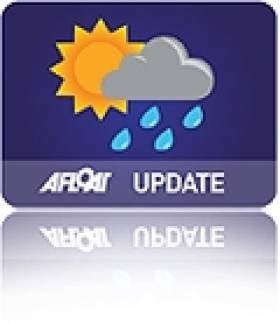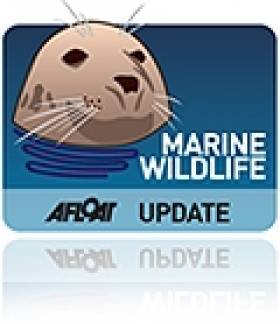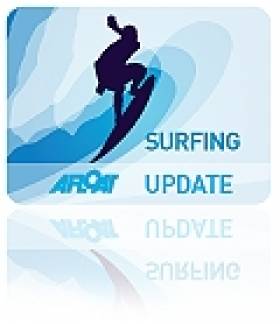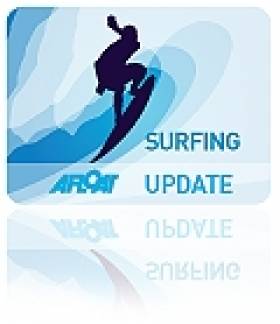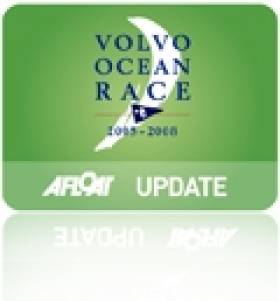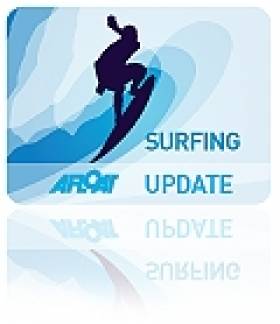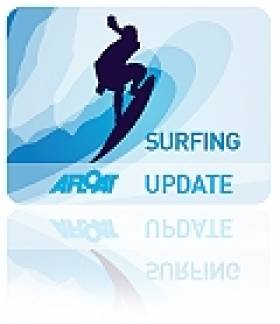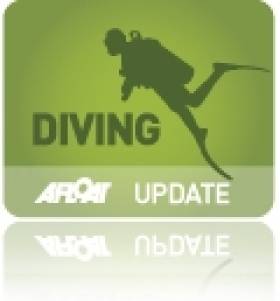Displaying items by tag: YouTube
#WEATHER - The Irish Times reports on video of what appears to be an over-water tornado or 'seaspout' off the coast of Sligo last week.
The video above was captured at Rosses Point on the afternoon of Monday 7 May by Graeme Salter.
“I’ve been going to Rosses Point since I was a child and have seen some mad weather, but never anything like this,” he said.
Seaspouts or waterspouts are most often associated with dark, flat-bottomed cumulus cloud formations. They are not true tornados in the strictest sense, as they are not formed by the rotating updraft of a supercell thunderstorm.
The footage is the second occurrence of a waterspout in Ireland in recent weeks, following the mini-twister filmed at Bray Head last month as a massive thunder, lighting and hail storm hit the capital, as previously reported on Afloat.ie.
Another Humpback Whale Sighting - This Time in Northern Ireland
#MARINE WILDLIFE - The Irish Whale and Dolphin Group (IWDG) has confirmed a new humpback whale sighting, this time in Northern Ireland.
According to the IWDG, this is the third consecutive year that a humpback whale has been spotted in Northern Irish waters, with this sighting being only the fourth ever validated record for the species in the North.
IWDG sightings co-ordinator Pádraig Whooley described it as "an important development [that] highlights a trend towards increased sightings of this large baleen whale species in Irish waters."
He also remarked on the "unusual" location of the sighting in the fast-running waters of the Strangford Narrows at the Ards Peninsula.
The discovery comes just a week after confirmed sighting of two humpback whales at the opposite end of the island of Ireland, off Galley Head in West Cork, as previously reported on Afloat.ie.
New Harbour Charges Could End Trips to See Fungie
#IRISH HARBOURS - "Draconian" new charges for harbour users could bring an end to boat trips to see Dingle's most famous resident, according to The Irish Times.
Fungie the dolphin has been a mainstay of Dingle harbour for almost 30 years, but boat trips to visit him could cease to operate "with immediate effect" if charges of up to €9,000 are imposed "in advance" of the season.
Currently operators in the Dingle Boatmen's Association pay around €2,500 to use the harbour at the end of each season.
Association chairman Jimmy Flannery called on anyone working in tourism in Ireland to make submissions to the public consultation before the deadline next Friday 20 April.
As previously reported on Afloat.ie, yacht owners are also up in arms over the new charges proposed by Marine Minister Simon Coveney that could see their rates hiked by an incredible 800 per cent.
And the news comes not long after fellow Kerry harbour users protested proposed new bylaws to regulate their activities and impose new charges.
Irish Surfer Needs Funds to Attend Big Wave Awards
#SURFING - A young surfer from Lahinch in Co Clare is in the running for the 'biggest wave' prize in the 2012 Billabong XXL contest for his monster ride at Mullaghmore Head, The Irish Times reports.
Ollie O'Flaherty, 24, is nominated along with Devon's Andrew Cotton for the massive surf they caught off Co Sligo on 8 March last.
It was the first visit to the world-class big wave spot by O'Flaherty, a science student at NUI Galway who is a veteran of the Co Clare scene.
As previously reported on Afloat.ie, it was Cotton who tackled the biggest wave on that day - a giant 50-footer - as some of the world's top surfers took advantage of the Viking swell.
Also nominated for the $50,000 (€38,280) prize is Irish-American surfer Garrett McNamara, who last year rode what is being called the biggest wave ever surfed in the world, a 90-foot goliath off Nazaré in Portugal.
According to the Irish Independent, O'Flaherty has put out a call for sponsorship so he can attend the awards ceremony next month.
"It's a massive honor to be able to represent Ireland," he said, but added that he is "pretty much on the breadline from what I'm doing".
Should he win, the Lahinch native said he intends to "put every cent back into surfing" and replace his seven broken boards.
The winners will be announced at the Billabong XXL Big Wave Awards in Anaheim, California on 4 May.
March's Big Waves Tease a Wild Summer of Surfing
#SURFING - Irish surf classifieds website Surfseekers.ie has compiled some stunning images from March's world-class surfing conditions.
From the biggest rollers in years off Mullaghmore Head in Co Sligo to the Cliffs of Moher and even as far south as Kerry, Ireland has seen some of its best surf in a long time - and things are certainly looking up for an exciting summer on the waves.
Groupama Try Out a New Watch System
#VOLVO OCEAN RACE - Has the Groupama sailing team adopted a new simplified watch system, keeping just one man on deck to handle the vessel - as demonstrated by Ireland's Damian Foxall in the video above?
Don't worry - it's just a prank for April Fool's Day yesterday!
The yacht and its full compliment of crew have rounded Cape Horn and are currently in overall second place as the Volvo Ocean Race fleet heads to Itajaí in Brazil on the fifth leg and longest passage of the race.
Groupama and PUMA are currently battling for first place on the leg, with Telefónica hot on their heels after making up 180 miles in just 36 hours with speeds near double those of the frontrunners.
Top Surfers Tackle Biggest Rollers in Years Off Mullaghmore
#SURFING - It may have been too late for the postponed Tow-In Surf Session, but the big waves at Mullaghmore Head finally picked up this week - and some of the world's top surfers were there to take advantage of the swell.
As The Irish Times reports, an extreme weather system nicknamed the 'Viking storm' helped produced monster rollers on Thursday that are the biggest the area has seen in 15 years.
Devon surfer Andrew 'Cotty' Cotton rode the biggest wave when he tackled a 50ft giant, assisted by his Irish tow-in partner Al Mennie, while Brit boarder Tom Butler recorded the biggest barrel.
Richie Fitzgerald described the scene as "very calculated madness", noting that a safety crew was on hand as the 16-strong group took on the "huge, unruly and very dangerous swell".
The Irish Times has much more on the story, while Surfer Today has more video of the last winter swell at Mullaghmore Head HERE.
Stunning Video of Rip Curl Surfers 'Frozen in Time'
#SURFING - Rip Curl has posted some stunning video of Irish-Australian surfing pro Mick Fanning and his teammates captured using a Matrix-style '30 camera array'.
The technique, described by Rip Curl as a "a technological world first", uses a line of GoPro HD video cameras shooting consistently as surfers ride towards and past it, capturing unique "frozen moments of time" that create a virtual 3D effect.
See more video of the Rip Curl team's 'Mirage Moments' on YouTube HERE.
World Record Attempt by Irish-Raised Diver
#DIVING - Deep sea diver Sean McGahern is currently attempting the world record for cold water open sea diving in Malta.
The Times of Malta reports that McGahern - who was born in England but raised in Ireland before moving to Malta 17 years ago - entered the water at the Starfish Diving School before midnight last night, hoping to break the standing record of 11 hours and 46 minutes.
His previous attempt at the record was ended little more than an hour short of the record due to bad weather, but today's clear forecast has buoyed his confidence.
McGahern plans to pass the time by cleaning the seabed, assisted by a team of 16 safety divers, but he also intended to catch some sleep below the depths.
“I’ve slept underwater before," he said. "it’s not as difficult as you might think.”
McGahern, who previously held the warm water open sea dive record, is undertaking the challenge for Dar tal-Providenza, a home for the disabled on the Mediterranean island.
Kitesurfer Ross Harte Catches Big Air on Video
#KITESURFING - Dublin kitesurfing pro Ross Harte takes our breath away with this video shot from the top of his 12-metre kite, via WorldIrish.
The 30 knot winds are clearly no problem for this daredevil as he catches some big air from the blue surf.



























